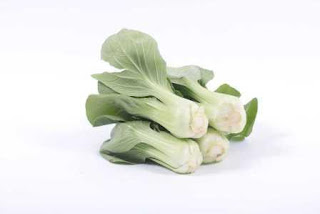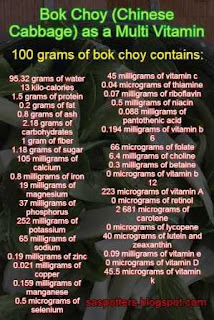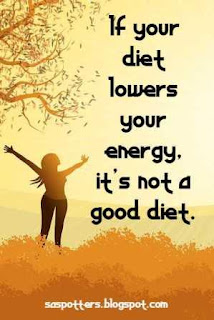 |
| Don't eat too much bok choy. |
Bok choy is a super food. It is low in calories and high in fiber and water. Bok choy gives your body almost all of the micro nutrients that it needs. Everybody should eat green leafy vegetables like bok choy.
This doesn't mean, though, that you can have as much as you want or eat it exclusively instead of other foods. Just like with any food group, green leafy vegetables become unhealthy when you eat too much of them. This can lead to serious health problems.
Disadvantages of bok choy
- Low in key nutrients: protein, fat, carbohydrates and calories
- Diminished appetite when eaten in excess
- Diarrhea, bloating and gas and other digestive issues when introduced into the diet
- One of the worst foods to eat before, during or after exercise
- Contamination, toxic pesticide residue and disease risk
 |
| Make it a part of a balanced diet. |
Nutritional content of bok choy
100 grams of bok choy contains:- 95.32 grams of water
- 13 kilo-calories (or 55 kilo-joules of energy)
- 1.5 grams of protein
- 0.2 grams of fat
- 0.8 grams of ash
- 2.18 grams of carbohydrates
- 1 gram of fiber
- 1.18 grams of sugar
- 105 milligrams of calcium
- 0.8 milligrams of iron
- 19 milligrams of magnesium
- 37 milligrams of phosphorus
- 252 milligrams of potassium
- 65 milligrams of sodium
- 0.19 milligrams of zinc
- 0.021 milligrams of copper
- 0.159 milligrams of manganese
- 0.5 micrograms of selenium
- 45 milligrams of vitamin c
- 0.04 micrograms of thiamine
- 0.07 milligrams of riboflavin
- 0.5 milligrams of niacin
- 0.088 milligrams of pantothenic acid
- 0.194 milligrams of vitamin b 6
- 66 micrograms of folate
- 6.4 milligrams of choline
- 0.3 milligrams of betaine
- 0 micrograms of vitamin b 12
- 223 micrograms of vitamin A
- 0 micrograms of retinol
- 2 681 micrograms of carotene
- 0 micrograms of lycopene
- 40 micrograms of lutein and zeaxanthin
- 0.09 milligrams of vitamin e
- 0 micrograms of vitamin D
- 45.5 micrograms of vitamin k
 |
| You get almost all your micro nutrients. |
1. Low in protein, fat, carbohydrates and calories
Bok choy (and other green leafy vegetables) is a great source of micro nutrients (vitamins, minerals, antioxidants, fiber). Due to the fact that they are over 95% water, they aren't very good sources of macro nutrients.
Low in protein
You need protein to make new tissue (brain, muscle, joint and heart, lung, skin, hair and nail tissue), antibodies, enzymes and blood. Low protein can diminish the quality of any of these parts of your body. In fact, low protein leads to many diseases, frequent infections, brittle nails, hair loss and depression.
If you weighted 70 kilograms (or 154 pounds), you would need to eat 5.8 kilograms (or 13 pounds) of bok choy to get your minimum daily protein requirement. This figure would increase if you weighed more or if you exercise regularly.
Compare that to 438 grams (or 15 ounces) of nuts or 302 grams of chicken for your daily, minimal protein requirement.
Bok choy just doesn't cut it as far as what you need regarding protein.
 |
| Don't miss out on key nutrients. |
Low in fat
Fat is extremely important to your health. It is a stable from of energy. Fats give us essential fatty acids that can't be produced within the body. It is an important component of cell walls and gives us the means to absorb fat-specific nutrients like vitamin A, vitamin D, vitamin E and vitamin K.Fat regulates your hormones and provides you with energy when you aren't eating food. It prevents energy burnout, insulates your body and protects your organs from damage.
You should eat 44 - 77 grams of fat per day, on average.
There are 0.2 grams of fat per 100 grams of bok choy. You would need to eat 22 kilograms (or 48.5 pounds) to 38.5 kilograms (or 85 pounds) of bok choy to get your daily fat requirement.
Avocado will give you 15 grams of fat per 100 grams. You would only need to eat 293 grams (or 10 ounces) to get your daily fat intake.
Learn about the types of fat - and which ones you should eat.
Eating too little fat can lead to excess hunger, dry skin, poor temperature regulation, mental fatigue and hormonal disruptions (loss of menstrual cycle in woman and low testosterone in men).
Good sources of healthy fats include avocado, cheese, dark chocolate, eggs, fatty fish, nuts, chia seeds, extra virgin olive oil, coconuts, coconut oil and full-fat yogurt.
 |
| Good fat foods come with other nutrients. |
Low in carbohydrates
Bok choy is an extremely low carbohydrate food at 2.18 grams of carbohydrates per 100 grams. This makes it a great option for people who want to eat a low carbohydrate diet or follow the keto diet.
It is not a good source of carbohydrates, however, for people who want to follow the health dietary recommendations.
This is how you can work out how many carbs you should eat. A moderate carb intake would be 75 to 150 grams per day.
Bok choy simply doesn't have enough carbohydrates to meet this carbohydrate goal. You would need to eat 2.78 kilograms (6.1 pounds) - 6.88 kilograms (15.2 pounds) of bok choy to meet the above goal.
Good sources of carbohydrates include vegetables, fruit, legumes, nut, seeds, whole grains and tubers.
You would only need to eat 429 grams (15 ounces) to 857 grams (30 ounces) of potatoes to get the right amount of carbohydrates.
 |
| Eat the healthiest type of carbs. |
Low in calories
Bok choy does not have enough calories to fulfill your daily caloric (energy) requirements, either.100 grams of bok choy has 13 calories. If you plan to consume the recommended 2000 calories per day, you would need to eat over 15 kilograms (more than 33 pounds) of bok choy!
While this makes it a great food to reduce your caloric intake and feel full, relying too much on bok choy has the disadvantage of starving your body of the energy that it needs.
Low calorie diets can be dangerous. They can cause fatigue, mental decline, muscle loss, diarrhea and constipation, eating disorders, depression, hormonal imbalances and gallstones.
Unhealthy diets that limit calories too much lead to more weight gain in the future. Your body will adapt by increasing appetite and lowering metabolism. This will cause greater weight gain as soon as you stop your unhealthy diet.
A good weight loss diet should make you feel more energized - not lacking for energy. It should improve your health so much that you never want to go back to unhealthy eating.
 |
| The best diets are sustainable. |
2. Diminished appetite when eaten in access
One of the disadvantages of bok choy is the fact that it can reduce your appetite. This might be great for people who want to lose weight, but it is not so good for people who struggle to eat enough as it is.
The large water content of bok choy adds bulk to the food without any nutritional value. Fiber takes longer to break down and sits in your gut for longer. This will prolong the time that it takes before you feel the need to eat again.
If you eat too many low-calorie, high-fiber foods; you won't feel hungry often enough to eat all of the nutrients that you need. This can lead to nutrient deficiencies and a weaker, undernourished body.
My appetite plummets as soon as I have my daily 5 fruit and vegetables (which are so important for all of the micro nutrients). To overcome this disadvantage, I eat my calorie-dense foods (that are high in proteins, fats and carbohydrates) first. I save my fibrous foods for the end of the day so that they don't stop me from eating all of the foods that my body needs.
Bok choy, as we have already seen, is high in so many beneficial nutrients. This doesn't mean that you can rely on it as your primary food source. Always choose a variety of different foods from different food groups so that your body gets all of the important nutrients.
 |
| Too much of any food can hurt you. |
3. Digestive issues caused by bok choy
Green leafy vegetables like bok choy are actually very good for your digestive system. The fiber feed good gut bacteria that regulate your immune system, turn food into nutrients and produce important chemicals that we can't get without them.
Fiber is hard to digest. It takes more work to break it down to access the nutrients. In the long run, this improves your digestive health.
Junk food is easily digestible and leaves you craving more in a short space of time.
If you have only recently started eating more healthy foods, green leafy vegetables like bok choy can be harder to digest than it should be because your digestive system is used to breaking down easily-digested nutrients.
This can lead to numerous digestive issues like bloating, diarrhea, gas, constipation and cramps.
Don't change your diet too dramatically in a short space of time. Give your body time to adapt. Eat smaller portions of fibrous food, at first, so that your digestive system has time to rediscover how to break it down.
Implementing dietary changes incrementally can negate the risk of digestive issues that big changes can cause.
 |
| Small changes are good for you. |
4. Bok choy is not good before or after exercise
Fiber and other food that is hard to digest causes blood to pool in your digestive system. This isn't a bad thing - this is a vital part of your digestive process.
The problem is the fact that your body will have less blood (with nutrients like energy and oxygen) for movement when it focuses on digestion. This is why we feel lethargic after a large meal.
Less blood flow will decrease the amount of exercise that you can do if you eat bok choy before exercise. Decreased blood flow will also reduce the amount of recovery that you get from exercise if you eat it afterwards for the same reason.
If you eat right before or after exercise, focus on food with less fiber and more carbohydrates, fats and proteins. Choose foods like peanut butter and bread, pasta, eggs, chocolate milk, yogurt and fruit (like grapes and bananas). Here are great workout snacks for people on keto.
 |
| Eat smart. |
5. Bok choy may present a contamination and disease risk
Healthy food tends to spoil easily. This is not only an inconvenience, but a health risk to you and those around you.
Avoid bok choy that looks a little off at the store. Throw it out when it starts to spoil and wash it before you cook with it. This will help to reduce the risk of contamination.
There is also a risk of toxic ingestion of the pesticides and fertilizers used to grow bok choy. This is another important reason to wash all of your fresh produce.
 |
| Eat clean. |
Bok choy will remain one of the best healthy foods to eat. The disadvantages show that you can't eat it exclusively, or in too high quantities, because you need to get all of the nutrients that your body needs through a variety of different foods.
Include it as part of a balanced, healthy diet and you are all set to go. Stay Strong!
 |
| Support our website and buy these awesome Socks. |
No comments:
Post a Comment